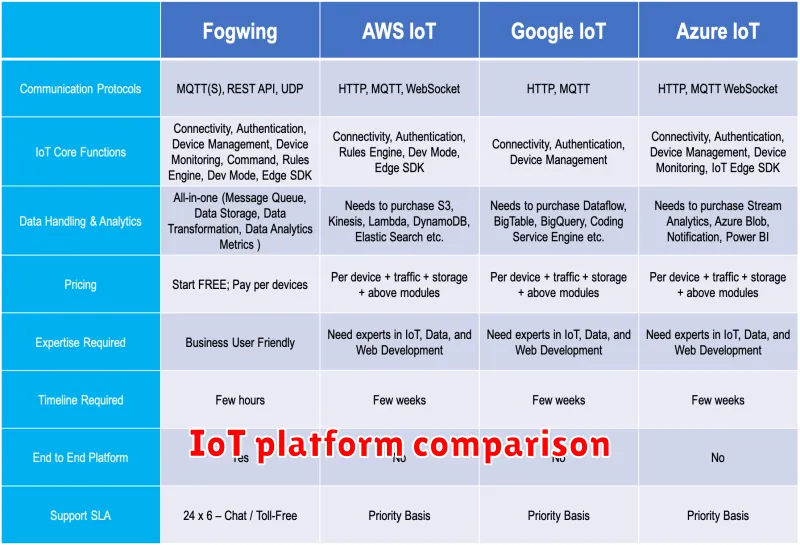In the age of interconnected devices and vast data streams, the Internet of Things (IoT) has emerged as a transformative force across industries. From smart homes and connected cars to industrial automation and healthcare monitoring, the IoT is revolutionizing how we live, work, and interact with the world around us. At the heart of this revolution lie IoT platforms, which provide the essential infrastructure and tools for businesses to build, deploy, and manage their connected solutions.
Choosing the right IoT platform is crucial for unlocking the full potential of the IoT and driving meaningful business transformation. With a plethora of options available, navigating the landscape can be overwhelming. This article will delve into the world of best IoT platforms, exploring their key features, benefits, and use cases. We’ll guide you through the factors to consider when selecting the ideal platform for your specific needs, empowering you to harness the power of the IoT and gain a competitive edge in the connected era.
Understanding the Power of IoT Platforms
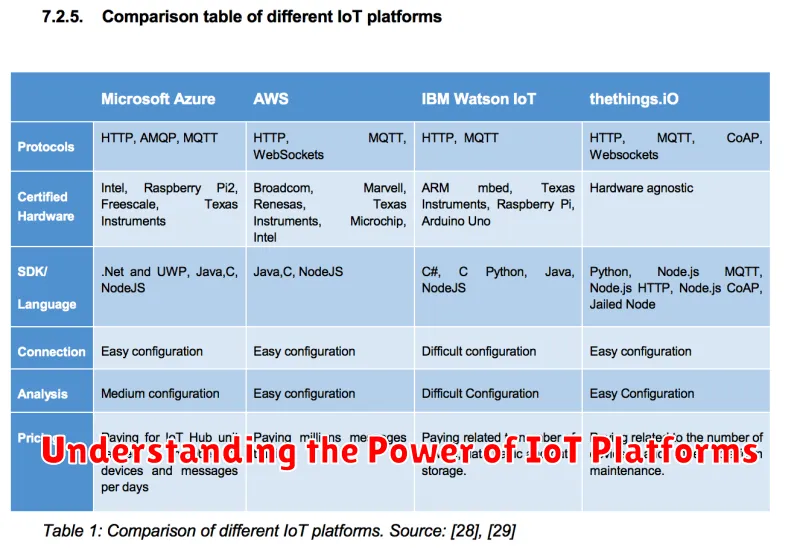
The Internet of Things (IoT) is transforming businesses across industries, enabling greater connectivity, automation, and data-driven insights. At the heart of this revolution lie IoT platforms, powerful software solutions that bridge the gap between physical devices and the digital world.
These platforms act as central hubs for managing and orchestrating connected devices. They provide a comprehensive framework for:
- Device Management: Securely connecting and managing a diverse range of devices, including sensors, actuators, and gateways.
- Data Acquisition and Processing: Collecting real-time data from devices, processing it, and converting it into actionable information.
- Application Development: Enabling the creation of custom applications and services that leverage IoT data and functionalities.
- Analytics and Visualization: Providing tools for analyzing data patterns, identifying trends, and generating valuable insights.
- Security and Privacy: Ensuring the secure communication and data protection of connected devices.
IoT platforms empower businesses to unlock the full potential of their connected devices, leading to significant benefits such as:
- Enhanced Operational Efficiency: Streamlining processes, optimizing resource allocation, and minimizing downtime.
- Improved Customer Experience: Delivering personalized services, proactive support, and enhanced product offerings.
- New Revenue Streams: Creating innovative business models and generating new revenue opportunities from connected data.
- Data-Driven Insights: Gaining a deeper understanding of operations, customer behavior, and market trends.
By leveraging the power of IoT platforms, businesses can embrace the connected era and unlock a world of possibilities, transforming their operations, enhancing customer experiences, and driving sustainable growth.
Key Features to Look for in an IoT Platform
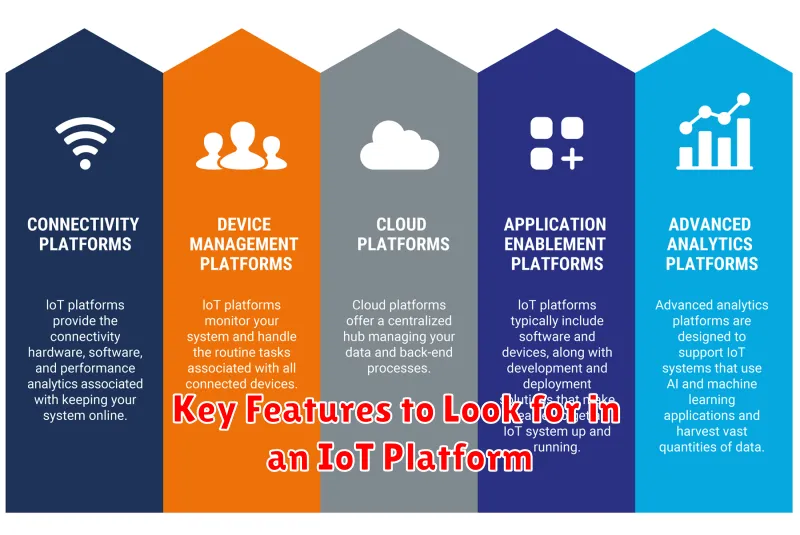
In the age of interconnected devices and data-driven insights, selecting the right IoT platform is crucial for businesses seeking to harness the power of the Internet of Things. A robust IoT platform should provide a comprehensive set of features to support seamless device connectivity, data management, analysis, and application development.
Here are some key features to look for when evaluating IoT platforms:
1. Device Connectivity: An IoT platform should offer flexible and scalable device connectivity options. Look for support for various communication protocols, including MQTT, CoAP, Bluetooth, Wi-Fi, and cellular networks. The platform should seamlessly connect to a wide range of devices, from sensors and actuators to wearables and industrial equipment.
2. Data Ingestion and Processing: The platform should efficiently collect, process, and store vast amounts of data generated by connected devices. Real-time data ingestion capabilities are essential for applications demanding immediate insights. Advanced features like data aggregation, filtering, and transformation enable you to manage and prepare data for analysis and action.
3. Data Analytics and Visualization: Data is the lifeblood of any IoT solution. The platform should provide powerful analytics tools to derive meaningful insights from your data. Look for capabilities like data visualization dashboards, predictive analytics, and machine learning algorithms. These tools help you understand trends, patterns, and anomalies in your data, enabling you to optimize operations and make data-driven decisions.
4. Application Development and Integration: The platform should facilitate the development and deployment of custom applications for your specific needs. APIs and SDKs enable integration with existing business systems and third-party services. A comprehensive suite of development tools and libraries simplifies the process of building innovative IoT solutions.
5. Security and Privacy: Security is paramount in the IoT ecosystem. The platform should offer robust security features, including data encryption, access control, and authentication mechanisms. Compliance with industry standards like GDPR and ISO 27001 demonstrates the platform’s commitment to data privacy and security.
6. Scalability and Reliability: An IoT platform should scale with your business needs. The platform’s infrastructure must be able to handle an increasing number of connected devices and data volumes. High availability and redundancy are essential for ensuring continuous operation and data integrity.
By considering these key features, businesses can choose an IoT platform that aligns with their specific requirements and empowers them to unlock the full potential of the connected era.
Top IoT Platforms for Businesses
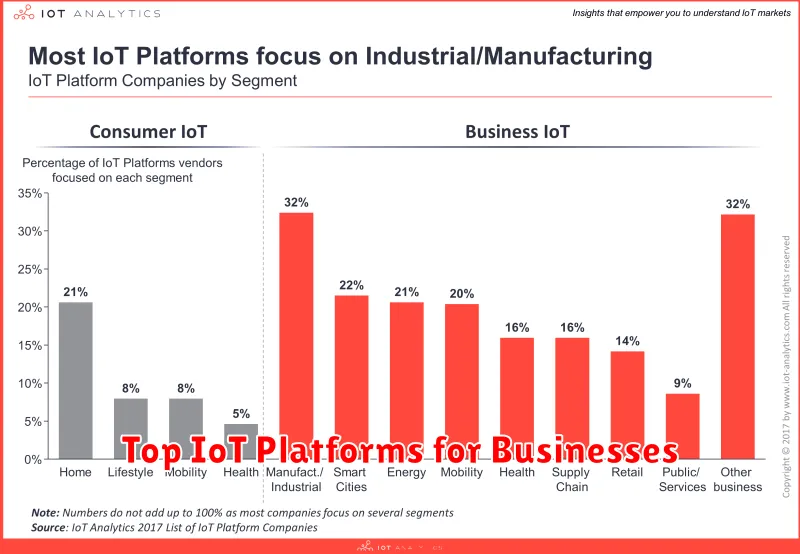
The Internet of Things (IoT) is transforming businesses across industries. From manufacturing and logistics to healthcare and retail, IoT solutions are enabling organizations to gain real-time insights, automate processes, and improve efficiency. To leverage the power of IoT, businesses need the right platform. Choosing the best IoT platform can be a challenge, with so many options available. Here’s a list of some of the top IoT platforms for businesses:
1. AWS IoT Core
Amazon Web Services (AWS) is a leading cloud provider, and its IoT Core platform is a comprehensive solution for managing and connecting IoT devices. AWS IoT Core offers a range of features, including device management, data ingestion, and analytics. It is highly scalable and secure, making it suitable for businesses of all sizes.
2. Microsoft Azure IoT Hub
Microsoft Azure IoT Hub is another powerful IoT platform that provides a central hub for connecting, monitoring, and managing your IoT devices. Azure IoT Hub offers robust features like device provisioning, message routing, and device twins, making it a popular choice for enterprises.
3. Google Cloud IoT Core
Google Cloud IoT Core is a managed service that allows businesses to connect, manage, and process data from their IoT devices at scale. Google Cloud IoT Core offers a variety of features, including device registration, data ingestion, and device management. It’s well-integrated with other Google Cloud services, making it a compelling option for businesses using Google’s cloud ecosystem.
4. IBM Watson IoT Platform
IBM Watson IoT Platform is a comprehensive platform that combines connectivity, data analytics, and cognitive computing capabilities. IBM Watson IoT Platform empowers businesses to gain insights from their IoT data and use AI to optimize operations and create new business models.
5. ThingSpeak
ThingSpeak is an open-source platform that allows businesses to collect, store, and analyze data from IoT devices. ThingSpeak provides an easy-to-use interface for connecting devices and visualizing data. It is a great option for businesses looking for a free and flexible IoT platform.
The best IoT platform for your business will depend on your specific needs and requirements. It’s important to consider factors such as scalability, security, cost, and integration capabilities when making your selection. By choosing the right platform, businesses can unlock the full potential of IoT and drive significant improvements in efficiency, profitability, and customer experience.
AWS IoT
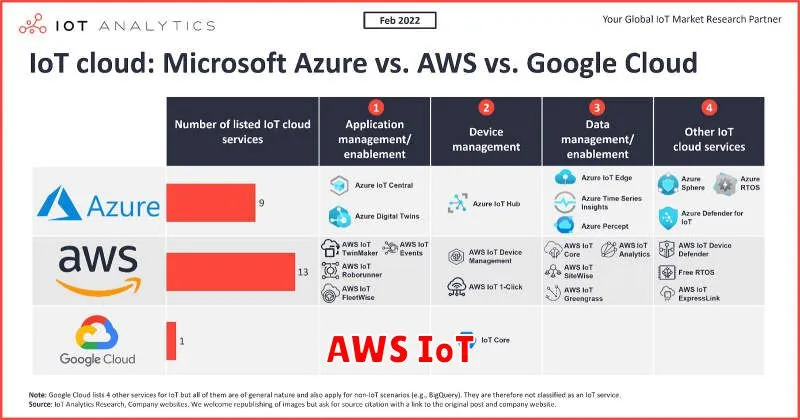
In the rapidly evolving landscape of the Internet of Things (IoT), choosing the right platform is paramount for businesses seeking to harness the power of connected devices. Amazon Web Services (AWS), a global leader in cloud computing, offers a comprehensive and robust IoT platform that empowers organizations to build, manage, and scale their connected solutions effectively.
AWS IoT stands out as a compelling choice for businesses seeking a secure, scalable, and feature-rich platform to power their IoT initiatives. Here’s why:
Key Features of AWS IoT:
- Secure Device Connectivity: AWS IoT facilitates secure two-way communication between devices and the cloud, ensuring data integrity and device authentication.
- Data Management and Processing: It provides tools for collecting, storing, and processing data from connected devices, enabling insights and actionable intelligence.
- Scalability and Reliability: AWS’s global infrastructure ensures high availability and scalability, handling vast volumes of data and device connections.
- Pre-built Services and Integrations: AWS IoT integrates seamlessly with other AWS services, such as Amazon S3, Amazon DynamoDB, and AWS Lambda, simplifying development and deployment.
- Comprehensive Security: AWS offers robust security features like device authentication, data encryption, and access control, safeguarding your IoT ecosystem.
Use Cases for AWS IoT:
AWS IoT finds applications in various industries and use cases, including:
- Smart Manufacturing: Optimizing production processes, monitoring equipment health, and reducing downtime.
- Smart Cities: Enhancing public safety, managing traffic flow, and optimizing resource utilization.
- Healthcare: Remote patient monitoring, connected medical devices, and improving healthcare outcomes.
- Retail: Inventory management, personalized customer experiences, and optimizing store operations.
Benefits of Choosing AWS IoT:
- Reduced Development Time and Cost: AWS IoT’s pre-built services and comprehensive platform accelerate development and minimize infrastructure costs.
- Enhanced Security and Compliance: AWS’s security features and compliance certifications ensure the protection of sensitive data and device integrity.
- Scalability and Flexibility: AWS IoT can seamlessly handle growing device connections and data volumes, adapting to evolving business needs.
- Global Reach and Support: AWS’s global infrastructure and extensive support network ensure reliable operation and expert assistance.
In conclusion, AWS IoT stands as a powerful and comprehensive platform for businesses embracing the IoT revolution. Its robust features, scalability, and security make it a compelling choice for building, managing, and scaling connected solutions that drive business transformation.
Microsoft Azure IoT
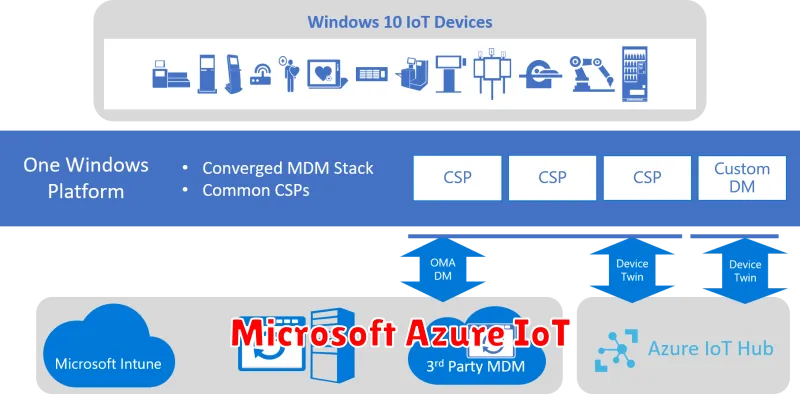
In the realm of Internet of Things (IoT) platforms, Microsoft Azure IoT stands as a powerful and comprehensive solution, empowering businesses to harness the transformative potential of connected devices.
Microsoft Azure IoT offers a robust set of services and tools, enabling seamless device management, data ingestion, analysis, and actioning, ultimately driving business innovation and efficiency.
Here are some key features that make Azure IoT a compelling choice:
- Device Provisioning Service: Effortlessly onboard and manage large numbers of IoT devices at scale.
- IoT Hub: Securely connect, monitor, and control devices, facilitating bidirectional communication.
- Azure Stream Analytics: Process real-time data from connected devices to gain actionable insights.
- Azure Time Series Insights: Visualize and analyze IoT data over time, providing a comprehensive understanding of device behavior.
- Azure Cognitive Services: Leverage AI capabilities to enhance IoT solutions, such as image recognition and natural language processing.
Azure IoT caters to a wide range of industries, empowering businesses to address diverse challenges and unlock new opportunities. For example, in manufacturing, Azure IoT can optimize production processes, reduce downtime, and improve quality control. In healthcare, it can enable remote patient monitoring, enhance diagnosis, and personalize care.
Ultimately, Microsoft Azure IoT provides a robust platform for building, managing, and scaling IoT solutions. With its comprehensive services and powerful capabilities, Azure IoT is a key driver of digital transformation in the connected era.
Google Cloud IoT
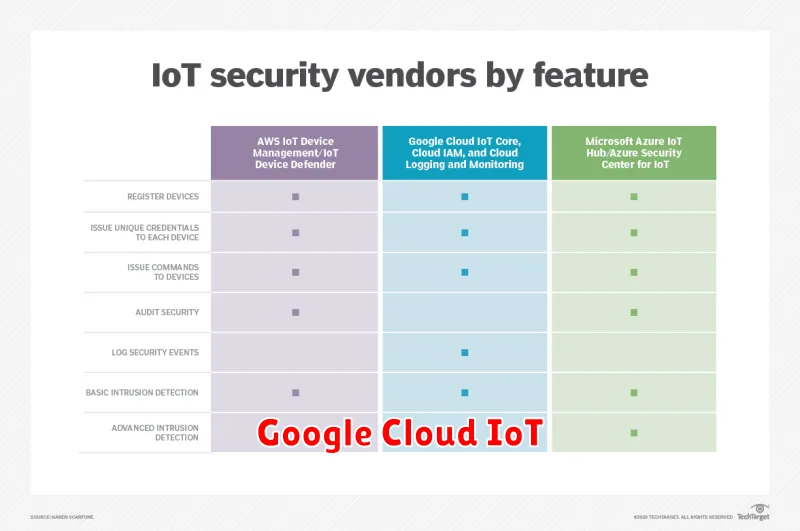
Google Cloud IoT is a comprehensive platform that enables businesses to connect, manage, and analyze data from their IoT devices. It offers a robust suite of services that cater to various needs, from device management and data ingestion to analytics and machine learning.
One of the key features of Google Cloud IoT is its device management capabilities. You can securely connect your devices, provision them with certificates and credentials, and monitor their status in real-time. Google Cloud IoT also supports various communication protocols, including MQTT, HTTP, and CoAP, ensuring compatibility with a wide range of devices.
The platform’s data ingestion and processing capabilities are equally impressive. Google Cloud IoT can handle high volumes of data from millions of devices, enabling you to store and analyze it in various formats. You can leverage Google Cloud’s BigQuery and Dataflow services for efficient data warehousing and processing, providing valuable insights into your connected devices and operations.
Furthermore, Google Cloud IoT integrates seamlessly with Google’s advanced machine learning and AI services. This empowers businesses to build intelligent applications that can learn from data patterns, predict device failures, optimize operations, and enhance user experiences.
Google Cloud IoT’s security features are paramount, ensuring the protection of your data and devices. The platform utilizes industry-standard security practices, including encryption, authentication, and access control, to safeguard your sensitive information.
Overall, Google Cloud IoT provides a powerful and flexible platform for businesses looking to leverage the power of IoT to drive innovation and transformation. With its comprehensive set of services, robust security features, and seamless integration with other Google Cloud services, it empowers businesses to connect, manage, and analyze data from their IoT devices, unlocking new possibilities for growth and efficiency.
ThingWorx
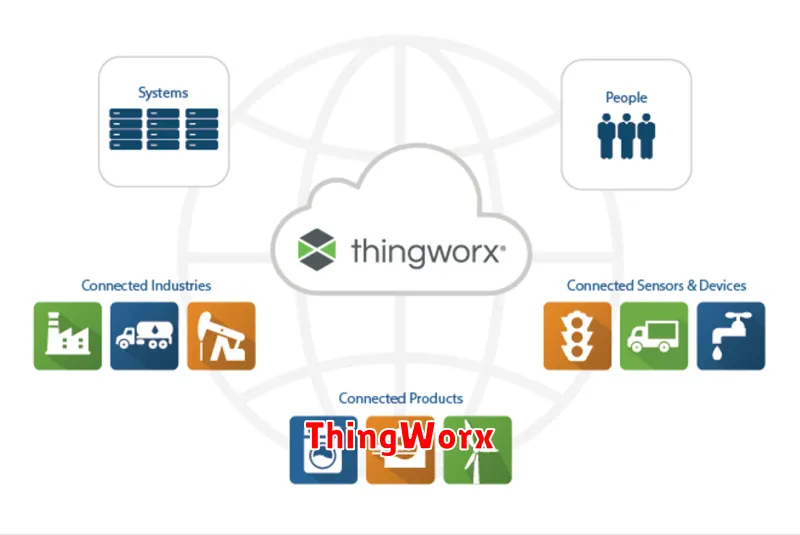
In the burgeoning landscape of the Internet of Things (IoT), choosing the right platform is paramount for organizations seeking to harness the power of connectivity. Among the leading contenders, ThingWorx stands out as a comprehensive and versatile platform designed to empower businesses in their IoT journey.
Developed by PTC, ThingWorx offers a robust set of tools and capabilities for rapid development, deployment, and management of IoT applications. Its intuitive interface and drag-and-drop functionality simplify the process of connecting devices, collecting data, and building custom applications, making it accessible to developers of varying skill levels.
One of ThingWorx’s key strengths lies in its comprehensive suite of features. From device connectivity and data acquisition to analytics, visualization, and application development, the platform provides a holistic solution for end-to-end IoT management.
Furthermore, ThingWorx excels in its ability to integrate seamlessly with existing enterprise systems, allowing organizations to leverage their existing infrastructure and data sources. This interoperability streamlines data flow and facilitates informed decision-making based on real-time insights.
The platform’s open architecture and extensibility enable customization and scalability, ensuring that businesses can tailor ThingWorx to their specific needs. This flexibility allows for integration with a wide range of devices, protocols, and services, making it a versatile solution for diverse IoT projects.
With its robust functionality, intuitive design, and seamless integration, ThingWorx empowers businesses to unlock the potential of IoT, driving innovation and transforming operations across various industries. Whether it’s optimizing production processes, enhancing customer experiences, or gaining a competitive edge, ThingWorx stands as a powerful ally in the connected era.
Cisco IoT Cloud Connect
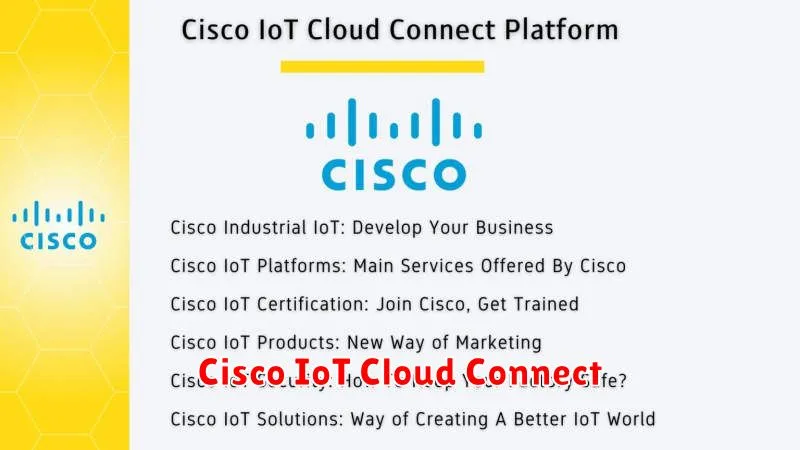
In the burgeoning world of the Internet of Things (IoT), robust and reliable platforms are essential for businesses to harness the power of connectivity and drive transformative outcomes. Among the leading contenders in this space, Cisco IoT Cloud Connect stands out as a powerful solution that empowers organizations to connect, manage, and analyze data from their diverse IoT deployments.
At its core, Cisco IoT Cloud Connect acts as a central hub, facilitating seamless communication between IoT devices, applications, and cloud services. This interconnectivity is crucial for enabling real-time data flow, facilitating device management, and unlocking valuable insights. The platform’s key strengths lie in its ability to:
- Simplify Device Connectivity: Cisco IoT Cloud Connect effortlessly connects various devices, regardless of their protocol or manufacturer, through its secure and scalable infrastructure.
- Streamline Data Management: The platform provides robust data management capabilities, enabling organizations to collect, store, and process data from their IoT devices efficiently.
- Unlock Powerful Analytics: Cisco IoT Cloud Connect leverages advanced analytics tools, allowing businesses to derive meaningful insights from their IoT data, leading to informed decision-making and optimization.
- Enhance Security: Security is paramount in the IoT landscape, and Cisco IoT Cloud Connect prioritizes data protection with robust security measures to safeguard sensitive information.
- Integrate with Existing Systems: The platform integrates seamlessly with existing IT systems and cloud services, simplifying deployment and enabling organizations to leverage their existing investments.
Cisco IoT Cloud Connect empowers businesses across industries to revolutionize their operations and unlock new possibilities in the connected era. By offering a comprehensive and scalable solution for IoT connectivity, data management, and analytics, it enables organizations to:
- Improve Operational Efficiency: Optimize processes, streamline workflows, and reduce downtime by leveraging real-time data insights from connected devices.
- Enhance Customer Experiences: Deliver personalized services, improve customer engagement, and create new revenue streams through connected experiences.
- Gain Competitive Advantage: Stay ahead of the curve by harnessing the power of IoT to innovate, optimize, and differentiate in today’s dynamic marketplace.
With its robust features, scalability, and comprehensive support, Cisco IoT Cloud Connect provides organizations with a reliable and powerful platform to embark on their IoT journey and drive transformative outcomes in the connected world.
IBM Watson IoT Platform
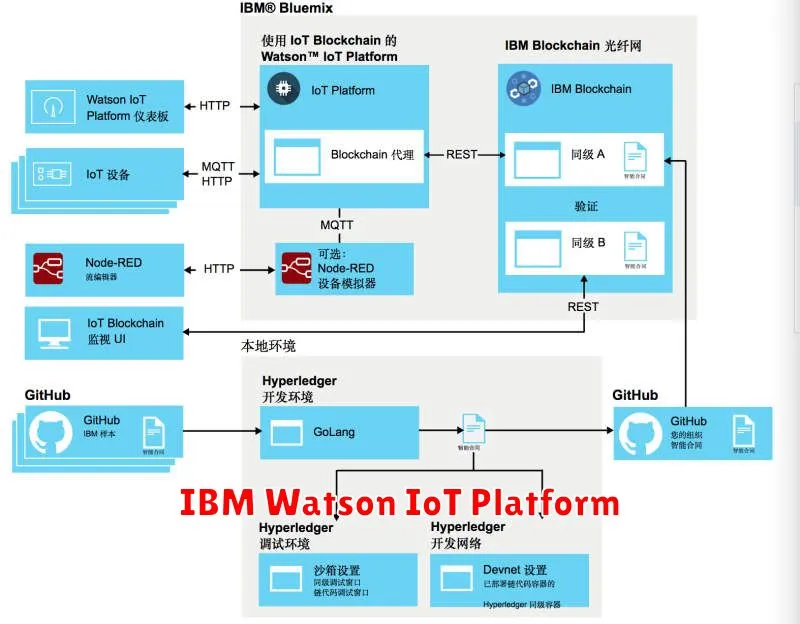
In the rapidly evolving landscape of the Internet of Things (IoT), businesses are seeking robust platforms to harness the power of connected devices and data. Among the leading contenders, IBM Watson IoT Platform stands out as a comprehensive and powerful solution. Built on a foundation of AI, cloud computing, and enterprise-grade security, it empowers organizations to build, manage, and analyze data from their connected assets, enabling smarter operations and innovative business models.
One of the key strengths of IBM Watson IoT Platform is its multi-tenant architecture, allowing businesses to easily onboard and manage diverse IoT devices. This scalability ensures that companies can seamlessly handle data streams from a wide range of sources, including sensors, wearables, industrial equipment, and more. Additionally, the platform’s built-in analytics capabilities enable real-time insights, predictive maintenance, and proactive decision-making. By leveraging powerful AI algorithms, businesses can analyze vast amounts of data to identify patterns, anomalies, and opportunities for optimization.
IBM Watson IoT Platform also emphasizes security, a crucial aspect in the connected world. With robust security protocols and data encryption, businesses can ensure the confidentiality and integrity of their sensitive information. The platform’s flexible deployment options allow organizations to choose the best fit for their specific needs, whether it’s on-premises, in the cloud, or a hybrid approach. This adaptability makes IBM Watson IoT Platform a valuable tool for businesses of all sizes and industries.
With its comprehensive features, including device management, data ingestion, analytics, and security, IBM Watson IoT Platform provides a comprehensive ecosystem for organizations to leverage the full potential of IoT. From optimizing operations to developing innovative products and services, the platform empowers businesses to navigate the connected era with confidence and drive transformative growth.
Choosing the Right IoT Platform for Your Business Needs
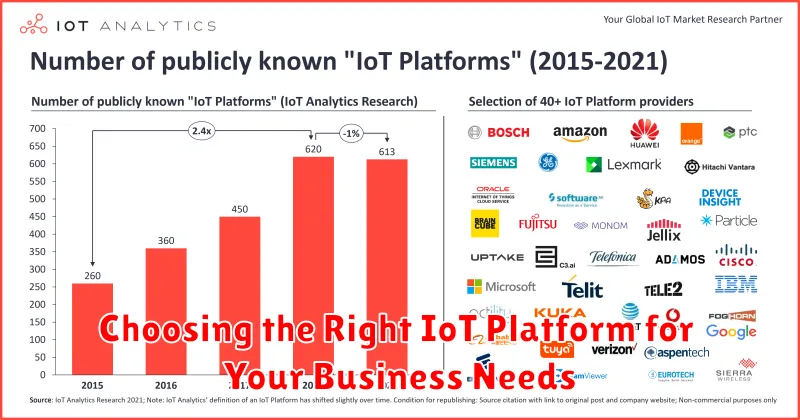
In the era of interconnected devices, choosing the right IoT platform is crucial for any business looking to leverage the power of the Internet of Things. With a myriad of options available, selecting the most suitable platform can be a daunting task. This article will guide you through the essential factors to consider when choosing an IoT platform that aligns with your unique business needs and objectives.
First, you need to determine your specific requirements. What type of data will you be collecting? How will you be using that data? What are your security and privacy needs? What are your budget constraints? Once you have a clear understanding of your needs, you can begin to narrow down your options.
Next, evaluate the key features of each platform. Look for a platform that offers the following:
- Device Management: Ability to connect, manage, and monitor devices.
- Data Acquisition and Processing: Capabilities for collecting, storing, and analyzing data from connected devices.
- Cloud Integration: Seamless integration with existing cloud infrastructure for data storage and analysis.
- Security: Robust security measures to protect sensitive data and devices.
- Scalability: Flexibility to accommodate growth in device connections and data volume.
- Developer Tools: Comprehensive tools and APIs to support application development.
Additionally, research the vendor’s reputation, customer support, and pricing model. Consider factors like ease of use, deployment options, and the availability of industry-specific solutions. Finally, explore the platform’s ecosystem and the availability of third-party integrations to enhance its functionality.
Choosing the right IoT platform is an important investment that can empower your business with valuable insights and transformative capabilities. By carefully considering your needs, evaluating platform features, and conducting thorough research, you can make an informed decision that sets your business on a path toward success in the connected era.

